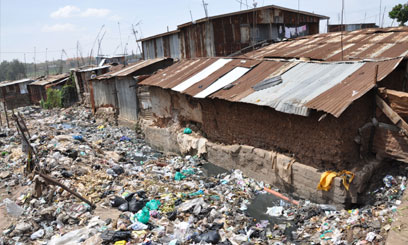While in Nairobi, I got the chance to visit Kibera, the
largest slum in Nairobi, and the largest urban slum in Africa. Population
figures vary drastically—reports claiming anywhere from 150,000 to 2
million in this “neighborhood.” Few, however, will argue that Kibera is not
overcrowded and in serious need of help.
I feel extremely fortunate to have visited Kibera with a
friend of a dear friend. Khohot, a recent graduate of the University of Nairobi,
had worked with a small, grassroots HIV/AIDS organization in Kibera, and knew
the area well. Organized tours of Kibera are available, and if you’re in
Nairobi you can easily arrange for someone to act as your guide, although I
personally would not have felt comfortable with such an arrangement. I will be
the first to admit that I was still very much a Western tourist in the slum, not unlike those who pay for organized tours. What makes me feel like my experience was somewhat different (and you are free to disagree) is that I went with a friend, to visit a friend, whose name and story I was excited to hear in exchange for my own. If you consider paying for a slum tour (in Kibera or elsewhere), I recommend leaving your camera in it's bag until you make a real, human connection with someone whose name you learn and who learns yours. People of a lower income status or education level are not less of people, and they are most certainly not tourist attractions.
 |
| Kibera is known for it's "Flying Toilets"-- without any type of plumbing, people relieve themselves into a plastic bag and throw it out the door. |
Khohot invited to me join him on a visit to his good friend
and community social worker, Josephine. We took the bus from downtown Nairobi
only ten minutes to the edge of Kibera, where we got off and walked into this
city within a city. I smelled it first. Piles, no, mountains of trash lay
everywhere. I’ve heard and read of various projects and programs aimed at
improving life in Kibera. Some are health, others education, even more involve economic development. What I think Kibera needs are some
city planners. I’ve heard time and time again Kibera’s problem is
overpopulation. It’s just too dense, too overcrowded. Well, so is New York
City, but that doesn’t stop the city from running, or people from paying absurd
amounts of money for closet space they call bedrooms. Mayor Bloomberg, I think Kibera could use
you and some of your advisers.
Khohot’s friend Josephine invited me into her one-room home
and told me about her work assisting those “infected and affected”. Her clients
are eighty plus children under the age of 18 who are living with HIV and
hundreds of adults also infected with the virus. She checks in with people on a
weekly or monthly basis, monitoring their anti-retroviral drug (ARV)
compliance, as well as their general emotional and physical health. Josephine
was diagnosed with HIV in 1997, and since then has been preaching, in her own
words, the “gospel of AIDS” to others. She told me in Kibera the stigma of
getting tested for HIV, and of being positive, has died down a lot. She said
the people who were least accepting were the medical nurses and doctors, who
are prejudice towards infected people. She told me her community was strong,
and that’s what kept her strong.
Josephine asked Khohot and me to go with her to visit
another two friends and clients. The first was her next door neighbor, a
fourteen year old girl named Jen, who had been diagnosed with HIV only weeks
before. Josephine had urged Jen to get tested when Jen came to her complaining
of constant illness and infection. Jen’s parents (who likely transmitted the
HIV virus to her) died in her rural village, leaving Jen to live with her
grandmother, and putting her in charge of two younger brothers, who died
shortly after their parents. Jen had moved to Kibera to help her older sister
take care of her own two children. When Khohot asked Jen how her sister earned
money, she looked towards the door and said “she’s gone in the night”.
Despite the incredible hardships Jen lives with, I saw in her eyes, and heard in her voice, a
determination and passion for something big. She spoke of her good grades in
school, and dream to one day open a safe place for HIV positive orphans, like
her. Jen did not ask me for money, for gifts, for school fees, or for a ticket
to America. She thanked me for visiting and apologized she had no tea or food
to offer. I told Jen she had given me inspiration for a lifetime.

No comments:
Post a Comment